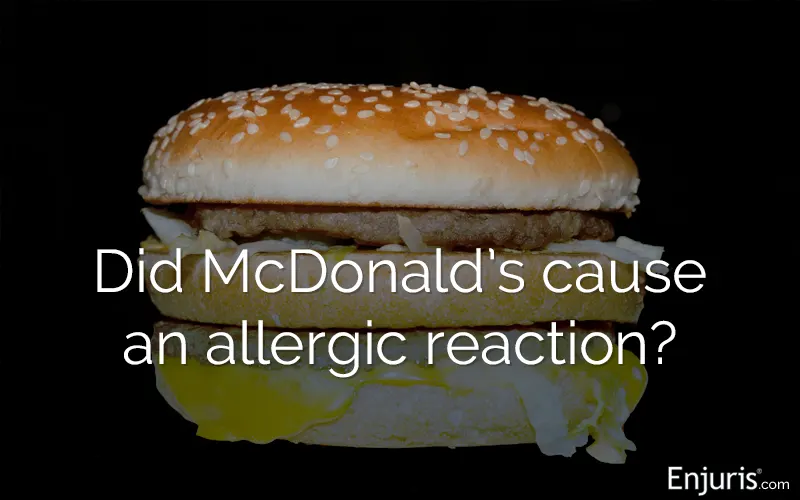
In a case reminiscent of the famous hot coffee lawsuit of the 1990s, a Florida jury found McDonald’s liable for an incident involving a scalding Chicken McNugget that fell on a customer’s leg causing second-degree burns.
Let’s take a closer look at the most recent personal injury lawsuit against McDonald’s to make the headlines.
Overview of the case
In 2019, Philana Holmes visited a McDonald’s drive-through in Tamarac, Florida, and purchased Happy Meals for her son and four-year-old daughter sitting in the backseat of the car.
As Philana drove away from the drive-through, her daughter started screaming.
According to court records, Philana pulled over and immediately saw a burn mark on her daughter’s leg. She used her iPhone to take a video of the burn mark. The video, later played in court, included Philana’s daughter screaming.
Philana filed a personal injury lawsuit against McDonald’s and the franchise owner, alleging that they:
- Failed to train employees adequately
- Cooked the McNugget to a much higher temperature than necessary
- Failed to warn customers about the dangerously high temperature of the McNugget
Trial and verdict
Jurors sat through two days of testimony and arguments about the incident that left Philana’s four-year-old daughter with second-degree burns on her upper thigh.
Although both sides agreed that the McNugget caused the burns, they disagreed about the temperature of the McNugget. The lawyers for the little girl argued that the temperature was about 200 degrees, whereas the defense argued that the temperature was no more than 160 degrees.
The defense also pointed out that the food had to be hot to prevent salmonella poisoning and that the McNugget was not meant to be pressed between a seat belt and human flesh for more than two minutes.
The jury ultimately found that McDonald’s was liable for failing to provide instructions for the safe handling of food and that the franchise holder was liable for failing to warn customers about the risk of hot food.
“Our sympathies go out to this family for what occurred in this unfortunate incident, as we hold customer safety as one of our highest priorities,” said McDonald’s owner-operator Brent Upchurch. “We are deeply disappointed with today’s verdict because the facts show that our restaurant in Tamarac, Florida, did indeed follow those protocols when cooking and serving this Happy Meal.”
A second jury tasked with deciding how much to award Philana’s daughter ultimately decided on an award of $800,0000. The jury’s verdict form allotted $400,000 for past damages, and another $400,000 for future damages.
Philana Holmes considered the award “fair” and noted that her daughter refers to the scar on her inner thigh as her “nugget.”
The other famous lawsuit against McDonald’s
Known simply as the “hot coffee case,” Liebeck v. McDonald’s Restaurants is probably the most well-known and misunderstood personal injury case in the history of the United States.
On February 27, 1992, Stella Liebeck purchased McDonald’s coffee. While sitting in the passenger seat of her grandson’s parked car, she tried to remove the lid to add cream while holding the coffee cup between her knees.
The cup tipped over, and the hot coffee spilled onto her lap.
Stella sued McDonald’s, alleging the coffee was too hot and caused significant burn injuries. The jury found McDonald’s guilty of serving coffee at an excessively high temperature and awarded Stella $160,000 in compensatory damages and $2.7 million in punitive damages.
One of the common misconceptions about the McDonald’s hot coffee lawsuit is that Stella was litigious and wanted millions of dollars. This couldn’t be further from the truth.
Stella spent six months trying to settle with McDonald’s for a mere $20,000 and then $15,000 to help cover her medical expenses, but McDonald’s refused. Instead, McDonald’s offered Stella $800. McDonald’s also refused Stella’s request to lower the temperature of their coffee to prevent future injuries to other customers.
Another common misconception is that Stella wasn’t seriously injured. In reality, Stella suffered third-degree burns on more than 16 percent of her body, including her inner thighs, genitals, and buttocks, where the skin was burned down to the layers of muscle and fatty tissue. As a result of her burns, Stella was hospitalized for eight days and required skin grafts and other extensive treatment. Her recovery lasted two years.
Learn the surprising true story behind the McDonald’s hot coffee case, including the fact that the plaintiff’s $2.7 million punitive damages award was reduced to $489,000.
Product liability lawsuits
Product liability lawsuits, such as those filed against McDonald’s, concern incidents in which a defective product harms a consumer.
Under product liability laws, manufacturers, distributors, and retailers may be liable if they sell a defective product. There are three main types of defects:
| Three types of product defects | ||
|---|---|---|
| Manufacturing defect | Design defect | Labeling defect |
|
A defectively manufactured product is one that—though properly designed—left the manufacturer in a condition other than intended. An example would be a pharmaceutical drug that became tainted by another drug during the manufacturing process. |
A defectively designed product fails to perform as safely as a reasonable person would expect, even when used as intended (or at least in a manner that was reasonably foreseeable). |
Manufacturers have a duty to warn users of the dangers that can be reasonably anticipated and that are inherent in their products. If the user is not properly warned, the product suffers from a labeling defect. |
Product liability cases can be complex and often require specialized knowledge and understanding of both legal and technical aspects. Therefore, if you or a loved one has been injured due to a potentially faulty or unsafe product, it is highly recommended that you seek the help of an experienced personal injury attorney.
McDonald’s Lawsuit For Allergic Reaction to Cheese in Big Mac
A 28-year-old man used DoorDash for a McDonald’s order and requested no cheese, but his Big Mac had cheese—and he had an allergic reaction. He then filed a lawsuit.

